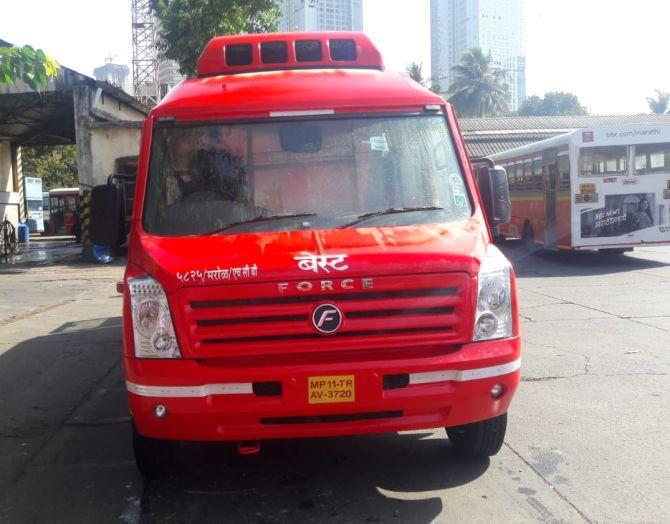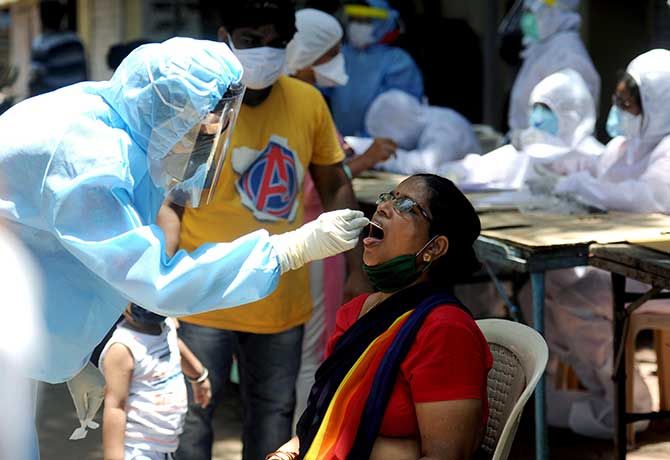 | « Back to article | Print this article |
'Cases are increasing, day by day, because testing has increased.'

Maharashtra Chief Minister Uddhav Thackeray had a video conference with the BrihanMumbai Municipal Corporation medical team over the weekend.
Over 110 BMC doctors came online.
It was a confidence-building exercise.
The doctors also all received promotions.
Through his address, which was apparently well received, Thackeray requested the doctors to remain strong, stay motivated and work with the private sector in Mumbai to fight and eradicate COVID-19 from the city.
The entire Mumbai urban area, as of May 25, has reported over 32,000 cases.
The death toll crossed a thousand on Monday and is pegged at 1,026 according to latest reports.
Also 1,430 new cases were reported May 25.
The Battle for Mumbai is on, as cases continue to rise alarmingly and show no signs of flagging yet, some 76 days after the city's first case.
There is an acute shortage of ICU beds in COVID hospitals across Mumbai.
Up to 15 to 20 virus-affected, serious patients, with comorbidities, are vying for one ICU bed, say BMC doctors.
The Maharashtra chief minister's office and the BMC are working to expand ICU capacity even as enormous field hospitals get ready to open.
Vaihayasi Pande Daniel/Rediff.com spoke, once again, to Dr Balkrishna Adsul, the dean in charge of the Seven Hills hospital, the largest COVID-19 facility in Mumbai, for an update on the city.

The worrying issues Mumbai hospitals are facing:
The difficulties we are facing is that the number of beds in Mumbai are less.
Number of positive patients are more.
We are getting 1,500 to 1,700 positive patients per day. Out of this 20 per cent require an ICU bed, which is not available, at present, in Mumbai.
Less ICU beds are there. Demand is more.
But we have less mortality. Only 65 deaths till date in Seven Hills; that constitutes 2.29 per cent only.
They are planning for ICU beds at the jumbo facilities that are starting in Mumbai in four or five places -- like the racecourse (the 600-bed COVID Care Centre, south Mumbai, which has 125 ICU beds earmarked), the MMRDA grounds (at the Bandra Kurla Complex, north west Mumbai) etc.
They are anticipating in one week (for ICU beds to actually come on board).
Let's see how it is going to happen.
It is a little difficult task definitely, but it is a necessity for the city, so with the help of everybody, we will get it done.
Once the private sector (comes forward) the shortfall can be patched.
ICU beds are available in private sector, but they're not giving it for COVID-19 positive patients.
There is a lot of demand for ICU beds for those with the comorbidity conditions, higher age, chronic kidney diseases.
But because of unavailability of the beds -- we have to sort it out -- it is first come first serve basis.
Yes (there is a little bit of shortfall in ventilators).
There is a shortfall of manpower, especially trained nursing staff and intensivists (critical care physicians) they are not available in Mumbai (The Maharashtra government wrote to the Kerala government on May 23 requesting the temporary recruitment of 50 doctors and 100 nurses. The letter has been quoted in various news reports).

The position with ambulances in Mumbai:
No, no shortage of ambulances.
In the last one week they have increased also.
Lot of deaths are there.
There is a queue in the inventory.
And then the problem is that a lot of people get panicked in the evenings and nights actually.
There is panic to get an ambulance also.
So, it becomes a little difficult.
Also it takes at least two hours for patients to get admitted some times.

Testing position in Mumbai:
There is a change of protocol once a week, actually, because many people who are asymptomatic may turn out to be positive.
No point in just testing only.
The protocol has been changed by the health minister periodically.
No, no, there is no shortage of testing kits. Kits are available.
But, definitely, all the resources are limited.
There is the load of testing -- the collection, the laboratories, the people who collecting; they are also afraid for their health, they are directly exposed to unknown cases.
Because there is a lot of testing load in Mumbai and there are limitations on testing staff resources.
Definitely do not want each and every individual, who might have come in contact (with a positive case) to test, until the time they have symptoms.

When the COVID-19 cases will be under control in Mumbai's slums:
A lot of overcrowding is there.
For one positive case, he or she, comes into contact with many of the people in the community.
No, at present it is very difficult to comment on this.
Cases are increasing, day by day, because testing has increased.
We will come to know soon what is the standing: Whether increasing, plateau or decreasing.
Production: Ashish Narsale/Rediff.com